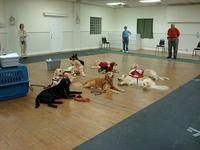Do you have what it takes to become a service dog foster family?

Ronald Wiedbusch | Contributor
For the past few years, my service dog Storm and I have been very involved in fundraising though events to help offset the training costs of service dogs here in Michigan. These events help pay for a lot of the health care and training associated with a service dog.
What they don’t help with though, is the raising of these new service dogs from puppies into adulthood. The only way to achieve that is through a foster family. There's an ever-present need for service dog foster families, but it's a topic that is never talked about much.
Puppy foster families are always one of the most scarce resources for many groups who train service dogs. The reason behind this is simple: it takes a lot of time, patience, and love in order to raise a puppy, and it gets harder yet when you know from the start that, at some point, your new dog will be moving on to another person.
Those who can accept this, though, and are willing take in a dog who is in training are heroes to people such as myself who rely on these trained dogs.
This spring I have been approached by a number of different dog training organizations who are all in need of new foster families, or individuals who can take care of the young service dogs. We already see more people most weeks than a lot of groups do with our work in the schools and communities in southeast Michigan, so trying to spread the word about foster families was just a natural addition to the work we all ready are doing.
The first thing I always encounter with people who are thinking of becoming foster families is that some have not thought of how much work is really needed for it. Their hearts are in the right place, but many don’t take into account how much work it is going to be.
Everyone who has ever raised a puppy knows it’s a lot of work. They need to be house trained, their diets need to be watched closely, and vet visits are far more frequent than with an adult dog.
The best way I can describe raising a service puppy, though, is by comparing it to raising a child. Think of all those things it's necessary to do for a child going to school, and then with a service puppy, it's like you're adding on extracurricular activities such as soccer practice. Service puppies require training from a very young age to get to the point that they are ready to be place with a handler.
To those who are not ready to put in that much work — and there is nothing wrong with that — I suggest other ways to help such as donations, or I might refer them to another organization that is looking for foster families, but who cannot handle the large time commitment that comes with service dog training.
Doing smaller things helps the goal of training service dogs as well.

Service Dogs in a training class.
Ronald Wiedbusch | Contributor
Then every now and again I run into someone that I call a "one percenter." These are people who have the time, experience and knowledge of dogs to really become a foster family for one of our dogs.
They have raised a puppy in the past, they have the extra time to be driving them to the many different training sessions that are required, and they are willing to go through the heartbreak that is inevitable when the puppy they have been taking care of is needed by a new handler.
These future service dogs are a big burden and time commitment to those are willing to take them on. The first year of a canine's life can never be repeated, so nothing but the best will do or be accepted as it relates to their health, care, diet, training and emotional well-being. They require a special person with a deep passion.
While this is a daunting task, it’s also rewarding. A foster family gets the love of a puppy, which leads to many more smiles and laughs than frustration. They also become part of a bigger community of dog lovers who are also taking care of other service animals.
Most of the foster families I have been around end up making new friends and working closely with trainers and other families to help raise the dogs. It’s a wonderful community that I’m glad I have managed to be a part of.
Fostering service dogs-in-training is something that is not for everyone. To those who can’t, I still encourage you to get involved though other means, and we will thank you for your much needed help. To those who think they have the time, patience and willingness to learn, though, there is always a new puppy who could use a home.
Ron Wiedbusch is a regular contributor to AnnArbor.com's pets section and works in the community to raise awareness about Assistance and Therapy Dogs and the Americans with Disabilities Act with his certified Assistance, Service, Rescue and Therapy Dog, Storm. The pair can be found at various places in the community throughout the week, and each day patrolling the area around Ypsilanti Public Schools as part of the Safe Schools Program. Ron can be reached via email.

